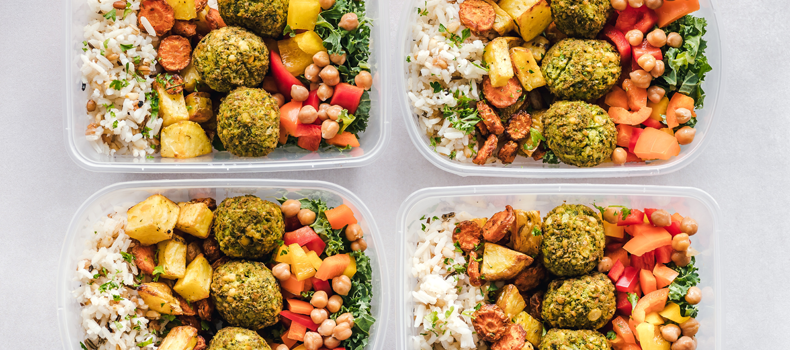Published June 1, 2021
The food we eat is central to our health, providing the very building blocks of our bodies. The latter are tremendously versatile and will do their very best with what they are given, but an inadequate diet will catch up with us eventually and our health will start to suffer.
Unhealthy foods have a certain grip on our psyches thanks to the realities of our ancestor’s lives. Food shortages and famines were an ever present threat for much of history, so we evolved with a deep attraction to calorie-dense, energy-rich foods like sweet fruit and fatty meats.
Eating as much as we could of these when they were available meant we could lay down reserves for those inevitable times when food was short. Evolution moves slowly and as a result we’re all still drawn to deliciously fatty, sugary foods that pile on the pounds.
But a healthier dinner plate pays definite dividends. Eating more healthily will:
- Reduce your risk of heart disease
- Reduce your risk of cancer
- Reduce your risk of diabetes
- Reduce your blood pressure
- Reduce your levels of cholesterol
- Improve your digestive health
- Help you lose weight
…and that is by no means an exhaustive list. A healthy diet has even been linked to improvements in mood and memory – and while that may sound unexpected, it makes perfect sense. The brain is the biggest organ in the body after all.
According to the Heart and Stroke Foundation, as much as 80% of all heart disease and strokes could be avoided by making the right food choices and getting sufficient exercise.
Making the right choices
If you’d like to eat more healthy food every day, stock up on the following the next time you do a food shop:
Fresh fruit and veg
This won’t be news to many people but fruit and vegetables are packed with health-boosting nutrients – vitamins, minerals, fibre and antioxidants. The latter counter the cell damage associated with ageing and disease.
Good intentions are one thing, but how do you actually eat more? Get into the habit of filling half of your plate with vegetables at every meal and always have fruit on hand to snack on if you feel hungry.
Whole grains
The unrefined grains in brown bread, rice, crackers and brown pasta and similar foods are high in health-boosting fibre, B vitamins and even protein. As these foods take time to digest, you will feel full for longer and so less inclined to over-indulge.
High protein foods
Protein is an important building block of the body and a key constituent of our bones, teeth and muscles. High quality protein can be found in:
- Fish and shellfish
- Lean meats
- Eggs
- Cheese
- Milk and yoghurt (preferably low fat and unsweetened)
At mealtimes, aim to fill around one quarter of your plate with protein.
Water
Prioritise water over every other drink. Hydration is essential to health but – contrary to popular belief – there is no set amount of water you should be drinking every day. Drink when you’re thirsty.
Meanwhile, cut down on:
Sugary drinks
An abundance of sugary drinks is available these days but most people would be shocked by just how much sugar is added to the colas and sweetened coffee bar confections available on every other street corner and supermarket shelf. You don’t need those calories. Do your body – and your waistline – a favour and keep sugary drinks to a minimum.
Remember that fruit juice – even 100 per cent pure fruit juice – is not as healthy as it may appear. While it does offer some vitamins and fibre it is also high in sugar – albeit unprocessed fruit sugar or fructose. So go easy.
Processed and fast foods
Easily available and oh-so-convenient, the processed food available in every supermarket is almost always low in health-boosting nutrients but high in fats, sugars and excessive salt. These are added to tap into those hardwired instincts and make these questionable foods more appetising. Fatty fast foods are also made to capitalise on the same hard-to-resist drives.
Keep fast and processed products to a minimum. An occasional treat is fine but they should not be a regular purchase. Make fresh foods the default.
Cooking good, unprocessed food at home is cheaper, healthier and ultimately much more satisfying, because you will no longer be consuming the empty calories of sugar and fat. It will also be very helpful for anyone wanting to lose a few pounds.
Why not create a weekly meal plan, with a repertoire of easy to make but varied meals made from as much fresh food as possible? An intolerance test is a great way to help ensure that you avoid foods that your body can’t handle.
Written by Bev Walton
Food Writer and Nutritionist, dietician
A chef of over 35 years with experience in all types of cuisine, dietary plans, recipe development, health and nutrition. I have been writing for over 10 years for both magazines, websites and ghostwriting for ebooks, Kindle and fully published books. I have a degree in nutrition and dietetics and work with restaurants and organisations within the healthcare profession. I am also able to take high quality photographs of recipes created. No writing task is too great, and whilst I specialise in the above, I am able to write about any topic you throw at me. Member of the Guild of food writers.

